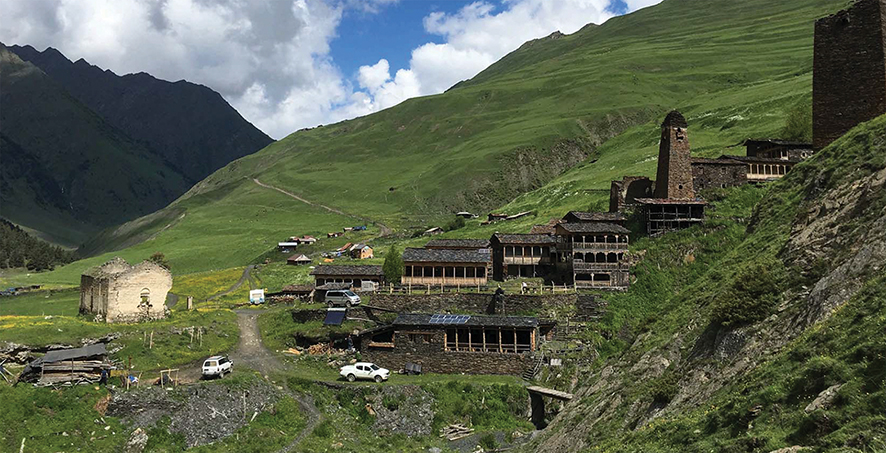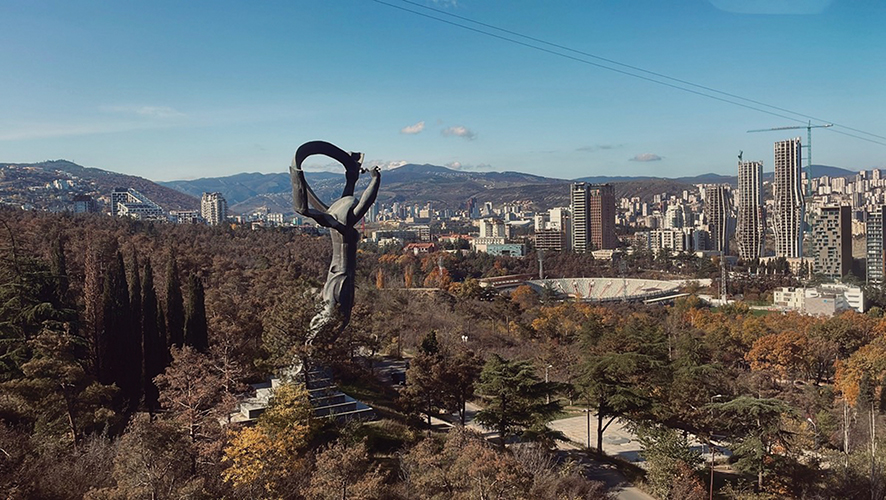Migration of the rural population of Sakartvelo to the country’s urban areas has been a long but also intermittent process. In the soviet era, migration was made difficult by the soviet government, which insisted on the perpetual attachment of the peasantry to their villages, kept in place by such means as not issuing them passports. Without a passport, it was neither possible to travel out of the country, nor to acquire a permanent residence in an urban area of Georgia. A regular peasant, and their family members, needed a special government permit to live in the city, and this kind of thing happened only rarely, when the government needed additional labor forces for the mills and factories it built inside or in the vicinity of big cities.
Today, in a free country of free people, migration has become the norm: One can live anywhere one wishes to reside, provided it is affordable. That’s the way the movement of the population from Georgia’s villages to towns began, the reasons for the exodus being many: paucity of employment, absence of entertainment, unfavorable living conditions, lack of personal development opportunities, healthcare drawbacks, bad roads or no roads between towns and villages, natural gas and electricity problems, hard farmland labor with nominal income, low-quality education, lack of electronic communication, blurry prospect for career-building, or forceful competition with foreign providers of agricultural products.

This is why we often see abandoned, unkempt and slowly degrading houses in villages, many of them quite sizable and still strong. Most of those village dwellers who stayed have up to one-and-a-half hectares of farmland, and their annual income totally depends on what and how much they harvest on the plot. Sometimes the harvest is plentiful, but the crops don’t sell; at other times, the market might be seller-oriented, but there is nothing to trade. It might also happen that the farmers manage to break even, but, understandably, this is rarely often enough to survive.
In most cases, young people leave their native lands to go where the commerce is better developed, because urban-area commercial activity seems to be one of the most realistic routes out of poverty to a better life, if not wealth.
Even if affluence does not loom on the horizon, those young men and women who manage to escape their parents’ indigent homes still feel happier as, in urban climes, they can easily find jobs, where survival opportunities are much more realistic. Take, for instance, the Kakheti region, which was abandoned by many local dwellers. The official statistics have it that over 90,000 people have left the area in the last decade and a half to dive into city life. Whether good or bad, they all relinquish the more or less tolerable conditions of their childhood homes to rent a small, modest place in the city, to pursue nominal wages, in the process happily tolerating any shortcomings or privations that normally accompany such an abrupt change in lifestyle.
Incidentally, this untoward medal has a bitter flip side: While the Georgian migrants think that the grass is always greener on the other side of the fence, other ethnic groups and nationalities are using their chance to come in and cultivate the relinquished farmland with measurable success, seeking to acquire a new dwelling place in beautiful countryside. This was seen even in the bygone soviet times, but then all the former soviet nationalities were ‘brothers and sisters’, so it all used to be taken in stride. Not today! Today, things are different. We, the ex-soviets, are already foreigners to each other, and giving up even the smallest chunk of territory is absolutely unacceptable. So, the migration of Georgians from rural to urban areas could be considered as a strategic issue of our national being, especially when it comes to the emptying of our mountainous settlements.

Experts might say that the natives of those places have an innate role to guard our territories: If they are in place, the borders are automatically protected, but if the locals move out, the selfsame borders become flagrantly vulnerable to trespassing and the settling of others. Tragic is for us the notion that the best place to be is somewhere else, but as the saying goes, a sacred place does not remain empty for long. We leave, somebody else will enter and grab it, so what to do? Are we stuck with this fate? Yes and no! Yes, if we give preference to our habitual twiddling of thumbs and don’t move a finger to rectify the situation; no, in the event of a state level strategy being created that is supported by our best western and eastern friends, allies and strategic partners, who can doubtlessly prompt us how to behave. It is not only Georgia that is suffering population migration threats. There is a huge experience accumulated in the world, and we can always use the extant topical lessons up to a point.
As a matter of fact, there is one big truth to it all: Nothing good will happen without serious capital investment, although we are not talking about billions of dollars. Let’s use affordable millions for starters, and the good beginning will surely make a good ending. Money is needed to develop the economic and cultural infrastructure, so as to keep people in those gorgeous Georgian villages, and to make creators out of them rather than ready-to-run-away pessimistic loafers. It would definitely make a lot of sense to have them forget that only those hills are blue that are far from us.
Blog by Nugzar B. Ruhadze














